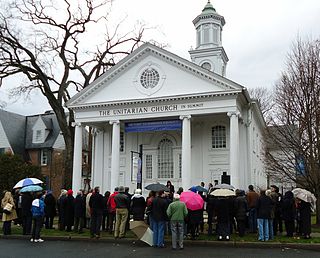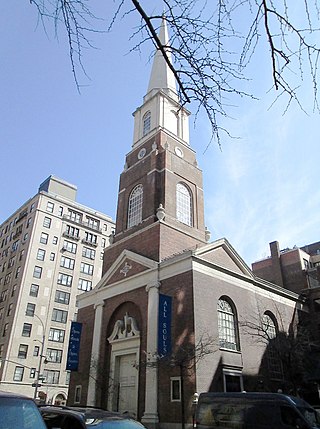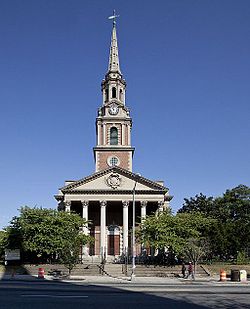
Unitarian Universalism is a liberal religious movement characterized by a "free and responsible search for truth and meaning". Unitarian Universalists assert no creed, but instead are unified by their shared search for spiritual growth. Unitarian Universalists do not have an official, unified corpus of sacred texts but rather draw inspiration and guidance from the Six Sources: personal experience, prophetic utterances, world religions, Jewish and Christian teachings, humanist teachings, and spiritual teachings. Unitarian Universalist congregations include many atheists, agnostics, deists, and theists and have churches, fellowships, congregations, and societies around the world.

James Joseph Reeb was an American Unitarian Universalist minister, pastor, and activist during the civil rights movement in Washington, D.C., and Boston, Massachusetts. While participating in the Selma to Montgomery marches actions in Selma, Alabama, in 1965, he was murdered by white segregationists and white supremacists, dying of head injuries in the hospital two days after being severely beaten. Three men were tried for Reeb's murder but were acquitted by an all-white jury. His murder remains officially unsolved.

The First Unitarian Church of Rochester is located at 220 Winton Road South in Rochester, New York, U.S. The congregation is one of the largest in its denomination, the Unitarian Universalist Association. The non-creedal church conducts programs in the areas of spirituality, social concerns, music, and arts. This church is one of two Unitarian Universalist congregations in Monroe County, the other being First Universalist Church of Rochester.
The Meadville Lombard Theological School is a Unitarian Universalist seminary in Chicago, Illinois.

Unitarian Universalism, as practiced by the Unitarian Universalist Association (UUA), and the Canadian Unitarian Council (CUC), is a non-Creedal and Liberal theological tradition and an LGBTQ affirming denomination.

The Unitarian Church of All Souls at 1157 Lexington Avenue at East 80th Street in the Upper East Side of Manhattan, New York City was built in 1932 and was designed by Hobart Upjohn – Richard Upjohn's grandson – in the Neo-colonial style with a Regency-influenced brick base. It is the congregation's fourth sanctuary. The congregation, dating back to 1819, was the first Unitarian Universalist congregation in the city. It has provided a pulpit for some of the movement's leading theologians and has also recorded many eminent persons in its membership.
Arthur Powell Davies was the minister of All Souls Church, Unitarian in Washington, D.C. from 1944 until his death in 1957. A prolific author of theological books and sermon collections, he came to national prominence in the U.S. through his liberal activism advocating civil rights for African-Americans and women and ethical stands against post-war nuclear proliferation and the methods employed by the American government during the era of McCarthyism.

All Souls Unitarian Church is a Unitarian Universalist (UU) church in Tulsa, Oklahoma. It is one of the largest UU congregations in the world.

The Second Congregational Church in New York, organized in 1825, was a Unitarian congregation which had three permanent homes in Manhattan, New York City, the second of which became a theater after they left it. In 1919 the congregation joined the Community Church Movement and changed its name to Community Church of New York. The same year its church, on 34th Street, was damaged by fire. Since 1948 the congregation has been located at 40 East 35th Street. It is currently part of the Unitarian Universalist Association.


Unitarian Universalist Church of Arlington (UUCA), historically known as the Unitarian Church of Arlington, is a Unitarian Universalist church located at 4444 Arlington Boulevard in Arlington County, Virginia. Founded in 1948, UUCA was the first Unitarian church in Washington, D.C.'s suburbs. Throughout its history, UUCA has taken part in progressive causes from the Civil Rights Movement to the legalization of same-sex marriage in Virginia. During the Civil Rights Movement, UUCA was the only Virginia church to speak out in favor of racial integration. UUCA's sanctuary building, designed by local architect Charles M. Goodman in 1964, is a concrete Brutalist structure that was listed on the National Register of Historic Places and Virginia Landmarks Register in 2014. It is one of only three church buildings designed by Goodman and the only one in Virginia.
Unitarian Universalist Church of Kent, Ohio is a Unitarian Universalist ("UU") church in Kent, Ohio. Founded in 1866, the current building was completed by builder Joseph Gridley (1820-1902) in 1868 on land donated by philanthropist Marvin Kent and rests on a bedrock of sandstone. Its 19 founding members were among the major movers and shakers of the then Village of Franklin Mills, and included abolitionists and Civil War veterans. They were: Dr. Aaron M. Sherman, M.D., who served as a Civil War surgeon, a prominent civic promoter, served many terms on the local school board, co-founded the Rockton Masonic Lodge that occupies the historic 1883 summer home of Marvin Kent on West Main Street, served as a State Representative in the Ohio State House of Representatives and whose 1858 home first built by Zenas Kent for his daughter Frances and her husband George Wells was recently saved, moved and restored by local historic preservation activists, Arvin Olin, Ransom Olin, Nelson Olin, Joseph Stratton, who, in 1882, donated the large bell that is in the church belfry, Phillip Boosinger, Mary Boosinger, Rhoda Boosinger, James D. Haymaker and Mary Rosetta Olin Haymaker, J.G. Whitcomb, T.H. Marshall, Eliza Wright, A. Merrell, Almund Russell, Sybil Bradley, Effie Parsons, Mary J. Parsons and Mary A. Furry. These 19 men and women gathered on May 27, 1866, to write and sign the church's constitution in the historic 1836 Village Hall that would serve as an early place of worship before the church building was completed next door in 1868. It is the only church still using its original 19th century building in the city of Kent and in 1976 the site was designed as a "significant restored building site". In the early and middle twentieth century when there were few women clergy anywhere in the United States, the church is notable for having several women ministers: Abbie Danforth in 1889, Carlotta Crosley in 1903, and Violet Kochendoerfer in 1972. Membership is between 140 and 200 full-time adults as well as 100 children in its religious education programs. The church runs a summer camp called Kent Hogwarts which is a Harry Potter-themed camp for young kids, which emphasizes chemistry, poetry, singing and community service. The church advocates social justice, environmental awareness, democracy and acceptance of diverse peoples including all religions. The Kent church follows the seven basic principles of Unitarian Universalism.
Rev. David Hilliard Eaton was the first African-American minister of All Souls Church, Unitarian of Washington, D.C., and an influential citizen of Washington DC politics from the 1960s until his death. Under his leadership, the All Souls Church became a center of social activism, with a racially balanced congregation.

The Unitarian Church of South Australia, Inc., is an independent and self-governed church affiliated with the worldwide Unitarian Universalist movement, a member of the Australia and New Zealand Unitarian Universalist Association, and an affiliate member of the Unitarian Universalist Association. It is a socially progressive and inclusive spiritual community, not covenanted by doctrine and dogma, but by liberal religious principles distilled from the essential values of all world religions, as well as the arts, humanities, and sciences.

Church of Our Father was the first Unitarian church established in Atlanta, Georgia. The church was organized on March 27, 1883, by Rev. George Leonard Chaney, a Boston minister. Rev. Chaney initially held Sunday services in the Senate Chamber, Concordia Hall and the United States Courtroom. A church building was constructed at the corner of North Forsyth and Church Street and dedicated on April 23, 1884. The original building was demolished in 1900.

The First Universalist Church of Atlanta, organized in 1895, re-established a Universalist presence in Atlanta, Georgia. Initial missionary efforts in 1879 were short-lived and failed to establish a permanent presence in the city. With the explicit assistance the Young People's Christian Union, this second missionary effort enabled the Universalists to sustain their presence and construct a church building on East Harris in 1900. The Universalists occupied the church until 1918 when they merged with Atlanta's Unitarians.

Cedar Lane Unitarian Universalist Congregation is a Unitarian Universalist church located in Bethesda, Maryland. The congregation is active in community service and social justice projects. The church is officially a "Welcoming Congregation" following the guidelines of the Unitarian Universalist Association, of which it is a member. Cedar Lane has weekly Sunday services and offers religious education classes for young people during the school year. Cedar Lane changed its name by congregational vote in 2023 from Cedar Lane Unitarian Universalist Church to Cedar Lane Unitarian Universalist Congregation in an effort to be welcoming and inclusive to all religions.

Mount Vernon Unitarian Church (MVUC) is a Unitarian Universalist church in the Fort Hunt area of Fairfax County, Virginia and a member of the Unitarian Universalist Association (UUA). It meets on a portion of the historic Hollin Hall estate. It is a long-time "welcoming congregation," which means it is open and affirming to all. The church has a long history of supporting LGBTQ rights and is an active social justice congregation.
Rebecca Ann Parker is an American theologian, author, and former President of Starr King School for the Ministry, the first woman to serve as the permanent head of an accredited U.S. theological school.


















